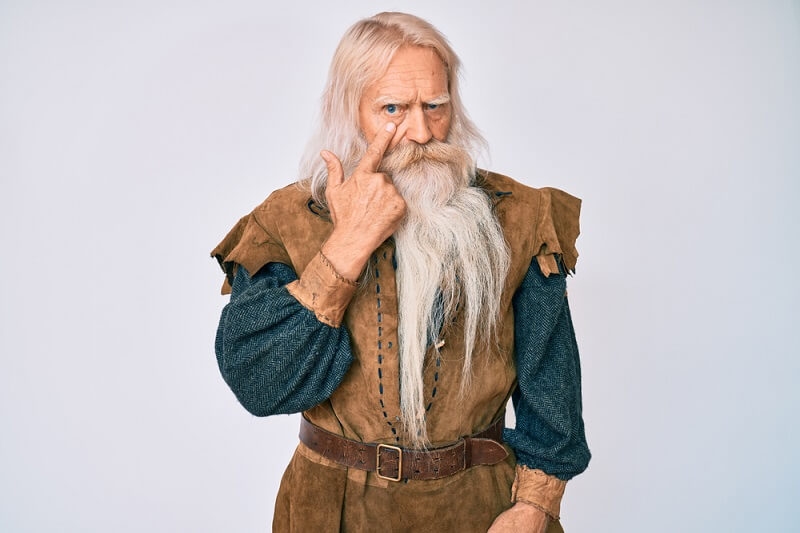
Historical Egyptians are celebrated for their opulent lifestyles, massive structures, and fascinating history. However, one thing from their daily lives regularly goes by the wayside—their careful body care. Among them, ancient Egyptian men's hair care secrets and techniques stand out, which are practical and expensive. This weblog delves into these timeless practices and suggests how they can inspire contemporary diversification, make classic memories engaging, and bring old records into lifestyles for young readers.
For the historical Egyptians, nursing was more than routine; it became a symbol of reputation, prowess, and spirituality. Hair played a good role in their identification, with patterns reflecting social status and personal beliefs. Egyptian men treated their hair to exquisite lengths, using natural elements and complex rituals to maintain its condition and appearance.
Their hair care practices are now less aesthetic. Hair became considered a gift from the gods, and its preservation became a way of worshiping divine blessings. This respect for personal care has been immortalized in classic stories and inspired cutting-edge readers to appreciate the timeless nature of self-care.
Must Read: Hair Grooming and Styling in Egyptian Royal Ceremonies
But there’s no denying that using natural oils has become one of the most iconic factors of Egyptian hair care. Nourishing your scalp and hair meant first that oils like castor, almond, and coconut had been used widely. Often! These oils were often infused with fragrant herbs such as rosemary or lavender to make them more luxurious.
Washing ourselves with these oils is less of a blessing and more of a reconnection to our past. Engaging narratives easing the teaching of these practices to younger readers could relate more conventional memories of historical Egypt and make them more interesting. Now imagine a story that tells the tale of a young, self-taught apprentice who goes out and brings in oils and mixes them with sports activities for readers to enjoy.
In ancient times, Egyptians typically donned wigs and hairpieces, particularly on the tails of formal gatherings or non-secular celebrations. And these wigs—from human hair or plant fibers—did everything they could do for you in a practical and symbolic sense. They protected natural hair from the harsh desert climate, and they also symbolized wealth and sophistication.
Today, you can use wigs to shade styling or take a different creative approach. We will introduce traditional testimonies to new readers by examining these traditions in literature and education. Instead, a youth book should be written by a man or woman with an extravagant wig created or donned—the window into an Egyptian antiquity subculture.
The Egyptians used stones and scrubs as hair cleansers, combining water, citrus extract, and herbal clays. These elements fetched impurities and imparted nutrients to the scalp. The idea of self-care, printed through a focus on cleanliness, indicates that it has remained time-tested.
Thoughts in their hair-washing rituals are considered today in natural shampoos and conditioners. Teaching timeless literature—including the testimonies set in ancient civilizations—is a challenge, and sharing these insights helps make it more enticing to younger audiences. Making a DIY clay hair mask can be an activity that will help you bring these historical practices into existence.

The beauty of these ancient practices is in their ability to adapt. Today’s modern hair care products are laden with ingredients from historical Egyptian hair training. Argan oil shampoos and clay-based hair masks draw directly from these timeless traditions.
Gift and the Alien can be a powerful connection with educators and writers. Introducing younger readers to traditional stories from around Egypt through history using related and regular practices can teach them more about history and literature. The modern child may wish the story would make these historical fundamentals discoverable, use them in his life, and bridge history and order.
Adapting traditional stories for young readers requires creativity and relatability. By translating these stories into everyday lifestyle factors such as hair care, they are increasingly at hand. For example:
These techniques are now not the most adept at making timeless literature engaging, but they additionally encourage young readers to join traditional reminiscences at private study. Educators can foster a sense of curiosity and connection by framing these rituals as relatable and realistic.
Historical Egyptian men's hair care secrets and techniques provide more than just beauty tips; they offer insight into a lifestyle that values self-expression, fitness, and spirituality. These timeless practices remind us of the frequent nature of self-care, transcending time and geography.
By incorporating these traditions into modern stories, we can:
Consider how the story might unfold in the study room: students learning about ancient Egypt may want to create their own "ancient" hair care products that combine the records with contemporary technology and creativity. Sports like these make records tangible and fun.
Egyptian historical men's hair care secrets and techniques testify to their marvels and the richness of that culture. Blending these timeless practices with state-of-the-art modern variations, we can craft relatable and vibrant stories for today’s audience. These rituals allow us to view history and humanity from a unique lens, from teaching immortal literature to creating their own related classics.
Placing these factors in an academic and literary context ensures that an awareness of what lies ahead will continue to inspire and educate future generations. Whether through a natural hair care exercise or the retelling of historical testimonies, the legacy of ancient Egypt lives on, connecting us across time and space.
Through the stories that characterize these cultivation traditions, young readers can study the cultural importance of self-care, the creativity of historical civilizations, and the enduring connection between the past and the present. By exploring these practices, we honor the legacy of historic Egypt and keep its rich history alive in the hearts and minds of new generations.
You May Read: Exploring Egyptian Religious Hair Practices and Rituals
The "Hair Care Secrets of Ancient Egyptian Men: This book, "Timeless Practices," teaches us from history how to groom and live. These historically legendary hair care rituals are timeless; they chronicle their inspirational effect on modern self-care rituals like we modernize classic literature and make the stories that time forgot relatable to today's children through modern adaptations. It gives the same honor to the past as the future, and as such, we honor the past as we blend it with the vintage needs of today. Whether teaching timeless literature or applying nourishing oils inspired by Egyptian traditions, the goal is to keep heritage alive. We can learn from history; let’s take one page, not just with our grooming but how we cherish and redefine the classics, keeping their modernity for decades. So why wouldn’t timeless practices like classic stories age out of style?
This content was created by AI